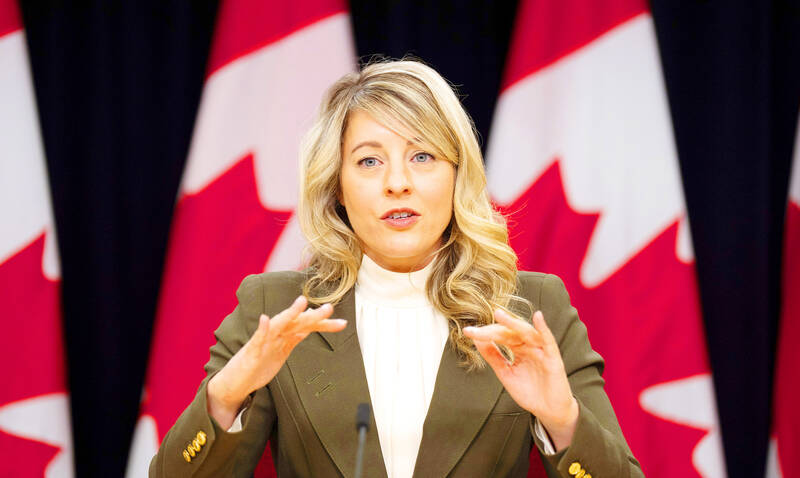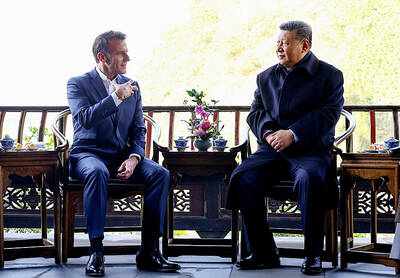China executed four Canadians in the past few months, Canadian Minister of Foreign Affairs Melanie Joly said on Wednesday, adding that she and former Canadian prime minister Justin Trudeau had asked for clemency in the drug-related accusations involving the dual citizens.
Beijing’s embassy in Ottawa said that the executions were due to drug crimes and added that China does not recognize dual citizenship.
“We strongly condemn the executions,” Joly told reporters in Ottawa. “I asked personally for leniency... They were all dual citizens.”

Photo: AP
Joly said that Canada consistently asks for clemency for Canadians facing the death penalty abroad.
She said the families have asked the government to withhold details of the identity of the four individuals.
Global Affairs Canada spokeswoman Charlotte MacLeod said that the agency — which manages Canada’s diplomatic and consular relations — continues to provide consular assistance to families and requested that the media respect their privacy.
Ottawa continues to advocate for clemency for Robert Schellenberg, a Canadian who was sentenced to death for drug smuggling, MacLeod said.
“China always imposes severe penalties on drug-related crimes,” a spokesperson for the Chinese embassy said. “The facts of the crimes committed by the Canadian nationals involved in the cases are clear, and the evidence is solid and sufficient.”
The People’s Republic of China (PRC) “fully guaranteed the rights and interests of the Canadian nationals concerned,” the spokesperson said, adding that Canada’s government should “stop making irresponsible remarks.”
The two countries have some tensions. China imposed retaliatory tariffs on some Canadian farm and food imports earlier this month, after Canada imposed duties in October last year on Chinese-made electric vehicles (EV), and steel and aluminum products.
“China is sending us a message that we have to take steps if we want to see an improvement in the relationship,” former Canadian ambassador to China Guy Saint-Jacques said.
Ian Brodie, a former chief of staff to former Canadian prime minister Stephen Harper, wrote on social media that it turns out “agricultural tariffs weren’t the worst part of the PRC response to EV tariffs.”
Opposition Conservative lawmaker Michael Chong said that “executing a number of Canadians in short order is unprecedented, and is clearly a sign that Beijing has no intention of improving relations with Canada.”
Amnesty International condemned the executions in a statement.
“These shocking and inhumane executions of Canadian citizens by Chinese authorities should be a wake-up call for Canada,” said Ketty Nivyabandi, the group’s head for English-speaking Canada.

PARLIAMENT CHAOS: Police forcibly removed Brazilian Deputy Glauber Braga after he called the legislation part of a ‘coup offensive’ and occupied the speaker’s chair Brazil’s lower house of Congress early yesterday approved a bill that could slash former Brazilian president Jair Bolsonaro’s prison sentence for plotting a coup, after efforts by a lawmaker to disrupt the proceedings sparked chaos in parliament. Bolsonaro has been serving a 27-year term since last month after his conviction for a scheme to stop Brazilian President Luiz Inacio Lula da Silva from taking office after the 2022 election. Lawmakers had been discussing a bill that would significantly reduce sentences for several crimes, including attempting a coup d’etat — opening up the prospect that Bolsonaro, 70, could have his sentence cut to

A plan by Switzerland’s right-wing People’s Party to cap the population at 10 million has the backing of almost half the country, according to a poll before an expected vote next year. The party, which has long campaigned against immigration, argues that too-fast population growth is overwhelming housing, transport and public services. The level of support comes despite the government urging voters to reject it, warning that strict curbs would damage the economy and prosperity, as Swiss companies depend on foreign workers. The poll by newspaper group Tamedia/20 Minuten and released yesterday showed that 48 percent of the population plan to vote

A powerful magnitude 7.6 earthquake shook Japan’s northeast region late on Monday, prompting tsunami warnings and orders for residents to evacuate. A tsunami as high as three metres (10 feet) could hit Japan’s northeastern coast after an earthquake with an estimated magnitude of 7.6 occurred offshore at 11:15 p.m. (1415 GMT), the Japan Meteorological Agency (JMA) said. Tsunami warnings were issued for the prefectures of Hokkaido, Aomori and Iwate, and a tsunami of 40cm had been observed at Aomori’s Mutsu Ogawara and Hokkaido’s Urakawa ports before midnight, JMA said. The epicentre of the quake was 80 km (50 miles) off the coast of

RELAXED: After talks on Ukraine and trade, the French president met with students while his wife visited pandas, after the pair parted ways with their Chinese counterparts French President Emmanuel Macron concluded his fourth state visit to China yesterday in Chengdu, striking a more relaxed note after tough discussions on Ukraine and trade with Chinese President Xi Jinping (習近平) a day earlier. Far from the imposing Great Hall of the People in Beijing where the two leaders held talks, Xi and China’s first lady, Peng Liyuan (彭麗媛), showed Macron and his wife Brigitte around the centuries-old Dujiangyan Dam, a World Heritage Site set against the mountainous landscape of Sichuan Province. Macron was told through an interpreter about the ancient irrigation system, which dates back to the third century